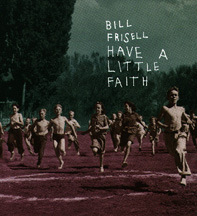Have A Little Faith
 Billy The Kid (Aaron
Copland)
1 The Open Prarie 3:11
2 Street Scene In A
Frontier Town 1:45
3 Mexican Dance and
Finale 3:44
4 Prarie Night (Card
Game At Night), Gun Battle 5:02
5 Celebration After
Billy's Capture 2:17
6 Billy In Prison 1:33
7 The Open Prarie Again
2:34
8 The "Saint-Gaudens"
In Boston Common :41
"Col. Shaw and his colored
regiment" (excerpt #1)
from Three Places
In New England (Charles Ives)
9 Just Like A Woman
(Bob Dylan) 4:49
10 I Can't Be Satisfied
(McKinley Morganfield) 3:00
11 Live To Tell (Madonna/Patrick
Leaonard) 10:10
12 The "Saint-Gaudens"
In Boston Common 3:05
"Col. Shaw and his colored
regiment" (excerpt #2)
from Three Places
In New England (Charles Ives)
13 No Moe (Sonny
Rollins) 2:37
14 Washington Post
March (John Philip Sousa) 2:05
15 When I Fall In Love
(Edward Heyman/Victor Young) 3:26
16 Little Jenny Dow
(Stephen Foster) 3:05
17 Have A Litle Faith
In Me (John Hiatt) 5:39
18 Billy Boy Traditional
1:38
Billy The Kid (Aaron
Copland)
1 The Open Prarie 3:11
2 Street Scene In A
Frontier Town 1:45
3 Mexican Dance and
Finale 3:44
4 Prarie Night (Card
Game At Night), Gun Battle 5:02
5 Celebration After
Billy's Capture 2:17
6 Billy In Prison 1:33
7 The Open Prarie Again
2:34
8 The "Saint-Gaudens"
In Boston Common :41
"Col. Shaw and his colored
regiment" (excerpt #1)
from Three Places
In New England (Charles Ives)
9 Just Like A Woman
(Bob Dylan) 4:49
10 I Can't Be Satisfied
(McKinley Morganfield) 3:00
11 Live To Tell (Madonna/Patrick
Leaonard) 10:10
12 The "Saint-Gaudens"
In Boston Common 3:05
"Col. Shaw and his colored
regiment" (excerpt #2)
from Three Places
In New England (Charles Ives)
13 No Moe (Sonny
Rollins) 2:37
14 Washington Post
March (John Philip Sousa) 2:05
15 When I Fall In Love
(Edward Heyman/Victor Young) 3:26
16 Little Jenny Dow
(Stephen Foster) 3:05
17 Have A Litle Faith
In Me (John Hiatt) 5:39
18 Billy Boy Traditional
1:38
Have A Little Faith is Frisell's take on the
American song writing tradition, from Madonna's pop to John Philip Sousa's
marching band music and Aaron Copland's ballet scoring. Frisell's take
on these tunes is pretty liberal, especially with Copland's "Billy The
Kid" score, where Copland's hints at confusion become fully fledged chaos,
with Coplands melodies floating around the confusion. However, like most
Frisell projects, the score has moments of exquisite beauty, especially
on the pensive spaciousness of "The Open Prarie".
High points on the album include the moody, haunting
cover of Madonna's "Live To Tell", ending in a screeching guitar solo ala
Jimi Hendrix. John Hiatt's beautiful ballad "Have A Little Faith In Me"
is also done with a quiet reverence. The abrupt silliness of "No Moe" and
"Washington Post March" is classic Frisell. These songs ring with an earnestness
and a ridiculousness, with the band screeching over "Rhythm Changes" chords
in "No Moe", and Frisell taking a distortion crazy solo over the goofy
"Washington Post March".
The band itself is something unusual; one usually
doesn't hear of many guitar-bass-drums-clarinet-accordion bands. However,
Byron and Glucevsek's coloring to the group is what makes this album so
interesting, and Frisell's orchestration of them works wonders. Glucevsek
makes you wonder why we don't hear the accordion more often in music, his
long, beautiful chords meld with Frisell's reverby tone beautifully, defying
the image of the accordion as a goofy oom-pah polka instrument.
This album is a wonderfully eclectic project, full
of quiet moments and revelations about how all different types of music
are structured. Frisell looks deep inside each piece to find what makes
it tick, avoiding the convention to just put a 4/4 swing or funk beat down,
play the melody, solo a bit and call it a cover. His intense scrutiny of
these songs and his personal take on them makes transitions from Charles
Ives to Bob Dylan seem not only natural but logical.
Bill Frisell: guitar
Don Byron: clarinet, bass clarinet
Guy Klucevsek: accordion
Kermit Driscoll: bass
Joey Baron: drums
All music arranged by Bill Frisell
Recorded March 1992 at RPM Studios, New York City
Home
// Albums
Index // Links
// Liner
Notes

